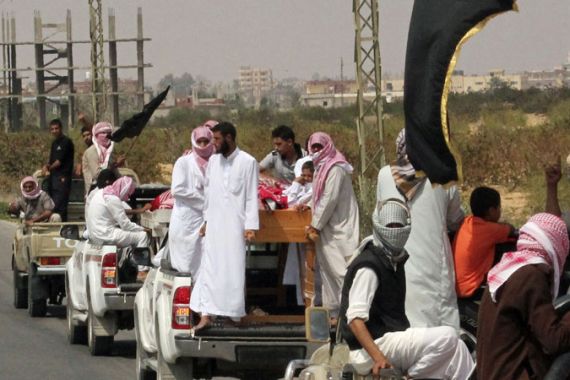Egyptian military strikes Sinai ‘terrrorists’
A spike of violence threatens a country already gripped by a political and security crisis.

Cairo, Egypt – The Egyptian military is executing an ongoing campaign against armed groups it says is targeting security forces in the country’s near-lawless Sinai region – but wrapped up in that battle is the larger question of Egypt’s stability in the face of the current political crisis.
Fighters based in the northern Sinai region bordering Israel have intensified their attacks on security forces since the military deposed Islamist President Mohamed Morsi on July 3.
Egyptian military spokesperson Ahmed Ali said that 25 men were killed or injured during an army operation on Saturday, involving a raid on weapons storage facility in Touma, near Sheikh Zuwaid in north Sinai, a region associated with violence and kidnappings.
Ali said the military strike targeted “terrorists” linked to the killing of Egyptian soldiers in August 2012.
|
|
| Deaths reported in latest Sinai air raid |
Saturday’s offensive followed the deaths of four men on Friday, with some reports citing anonymous Egyptian security sources saying the attack was carried out by Israeli drones.
However, Ahmed Abu Zeraa, a journalist and a resident of Sheikh Zuwaid, does not think Israel used drones in the strike.
He said that security cameras on the Israeli side of the border monitored a little-known group named Ansar Bayt al-Maqdis, which allegedly planned to launch missiles into Israel.
Israel’s role
The armed group claimed it was attacked by Israeli drones, although the Egyptian military denied that the attack was launched by Israel.
An admission of foreign military intervention – especially on the part of Israel – on its soil would leave the military here open to fierce criticism.
Israel, for its part, has neither confirmed nor denied its involvement in the strike.
A statement from Defence Minister Moshe Yaalon said that Israel would not bow to “rumours and speculation” which may damage its 1979 peace treaty with Egypt.
The Associated Press news agency reported on Sunday that Yaalon “appreciated” Egyptian military actions against militants in Sinai and that Israel “respects the full sovereignty of Egypt”.
The two countries have previously co-operated in targeting armed groups in Sinai, and despite the Egyptian military’s denials of Israel’s involvement, Abu Zeraa said such cooperation would only be logical:
“Ansar’s aim is to target Israel, with missiles waiting to be launched – that’s why Israel did not wait for Egypt to act.”
Strategic military expert Mokhtar Qandil, however, said he doubted that Israeli drones were used in Saturday’s attack.
“Maybe we exchange intelligence with Israel… but we will not allow them to operate on Egyptian territory,” he said.
Egyptians ‘can’t live in Sinai’
In a little mroe than five weeks, the Egyptian army said it has killed approximately 60 fighters in the Sinai peninsula, something that is the source of little controversy in the capital.
Qandil told Al Jazeera that the priority of Egypt’s Ministry of Interior and the military was “to prevent terrorism in north Sinai”.
“It is very dangerous in Egypt – we can’t live in Sinai now, and it is Egyptian territory, so we must finish al-Qaeda and terrorism there – we must clear it from terror,” said Qandil, a retired military general.
“After that, the military and the police will return to Nahda and Rabaa [where pro-Morsi sit-ins continue in Cairo] and clear those and start developing Egypt’s politics and economy.”
He blamed deposed president Mohamed Morsi for the worsening situation in Sinai, which is unfolding as Egyptian police close in on the 48-hour deadlinethey issued on Friday to clear the protests calling for Morsi’s reinstatement.
“He encouraged terrorist groups to operate in Sinai – from Afghanistan, from Pakistan, from [Palestinian] Hamas,” said Qandil.
Meanwhile, Abu Zeraa said that the past year had seen “an unprecedented increase in the number of armed groups, thugs and crime in Sinai”. He added that locals are divided on how they feel about military action in the area.
Those who do not support the military strikes, said Abu Zeraa, fear “a lot of innocent people will be killed and arrested” in the course of military action against armed groups.
“The local community wants to restore security here, but at the same time, military and police action seems random and unprofessional,” he said.
Indeed, the Egyptian military recently announced more than 100 arrests in the area on its Facebook page.
But many in Sinai support the attacks against armed groups – as they feel such groups “threaten Egyptian security and the border between Israel and Egypt”.
Spread of violence?
Negah Ibrahim, the one-time leader of the formerly militant Al-Gamaa Al-Islamiya group, said there were two issues to consider when placing the violence in Sinai in the greater context of Egypt’s instability.
“There is a prominence of militant jihadist thought in Sinai since 2003, after the [2002] Jenin massacre, and this al-Qaeda-like way of thinking has gotten a lot of support in the past two or three years, especially with the loosening of the security situation,” said Ibrahim.
These “radicals”, he said, have become armed with weapons smuggled from Libya and were trained by groups in Gaza, where he said Ansar Bayt al-Maqdis hails from.
Ibrahim also blamed Morsi. “He had no national security background,” he complained.
The other factor to consider is that the ousting of Morsi might serve “to justify the jihadist way of thinking, which equates democracy with an infidel system, contradicting the Sharia system”, said Ibrahim.
Follow @dparvaz on Twitter.